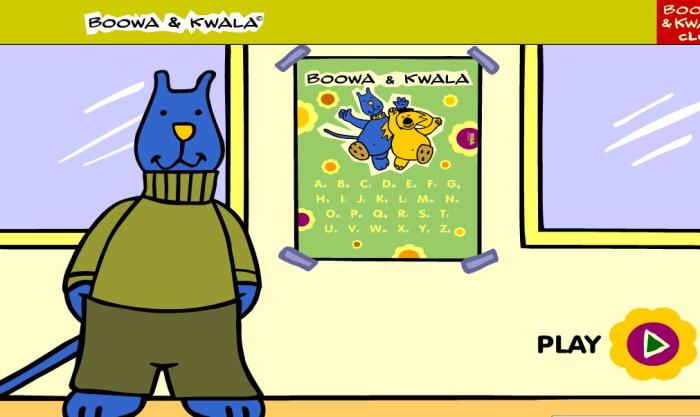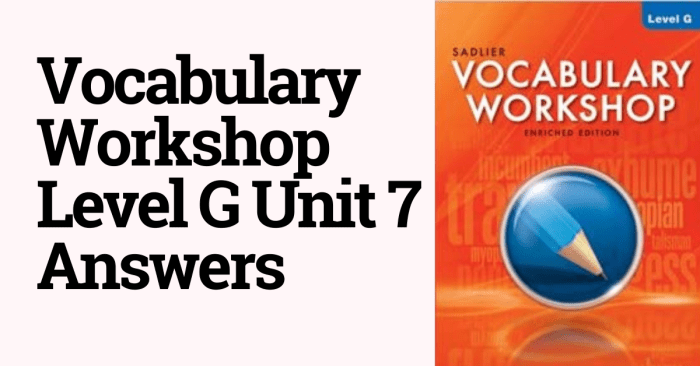Embark on a captivating journey with Vocab Workshop Level F Unit 6! This comprehensive workshop will equip you with the essential vocabulary to communicate effectively and enhance your language skills.
Delve into the intricacies of word meanings, engage in interactive activities, and expand your vocabulary beyond the confines of this unit. Get ready to unlock the power of words and elevate your language abilities.
Vocabulary Development
Unit 6 introduces a range of essential vocabulary words that enhance our understanding of the text and its themes.
Below is a list of key terms and their definitions, along with examples to illustrate their usage in context:
Key Vocabulary Words
- Apprehension:A feeling of worry or fear about something that may happen. Example: She felt a growing apprehension as she approached the unknown.
- Contagious:Capable of spreading from one person or thing to another, especially a disease or emotion. Example: The laughter was contagious, spreading through the crowd like wildfire.
- Enigmatic:Mysterious or puzzling, difficult to understand or explain. Example: The enigmatic smile on her face hinted at a hidden secret.
- Ephemeral:Lasting for a very short time, fleeting or temporary. Example: The beauty of the sunset was ephemeral, fading away as quickly as it had appeared.
- Gregarious:Sociable and outgoing, enjoying the company of others. Example: She was a gregarious person, always surrounded by a group of friends.
Usage in Context
These vocabulary words play a vital role in conveying the meaning and tone of the text. For instance, the word “apprehension” captures the character’s feelings of unease as they face an uncertain future. The term “contagious” highlights the spread of emotions and ideas, while “enigmatic” adds an air of mystery to the narrative.
By understanding these key vocabulary words, we can delve deeper into the text’s nuances and appreciate its literary devices.
Vocabulary Activities

Engaging activities are crucial for reinforcing vocabulary learning, making it more effective and enjoyable. These activities can range from games and puzzles to interactive exercises, providing diverse ways for students to practice and solidify their understanding of new words.
Games
Games offer a fun and competitive way to learn vocabulary. Consider incorporating games like:
- Word Charades:Students take turns acting out a word or phrase while their team tries to guess.
- Pictionary:Students draw a word or phrase on a whiteboard or paper, and their team tries to guess what it is.
- Vocabulary Bingo:Students fill in a bingo card with vocabulary words and then listen to or read a text. When they hear or read a word on their card, they mark it off.
Puzzles
Puzzles challenge students to think critically and apply their vocabulary knowledge. Try incorporating puzzles like:
- Crosswords:Students fill in a grid with words that match the clues, which may contain vocabulary words.
- Word Searches:Students find vocabulary words hidden in a grid of letters.
- Anagrams:Students unscramble letters to form vocabulary words.
Interactive Exercises
Interactive exercises provide opportunities for students to practice using vocabulary words in context. Consider using:
- Sentence Completion:Students complete sentences using vocabulary words.
- Story Writing:Students write short stories using vocabulary words.
- Online Quizzes:Students take online quizzes to test their understanding of vocabulary words.
Vocabulary Practice

To test students’ vocabulary knowledge, organize a series of practice exercises. These exercises can include multiple-choice questions, fill-in-the-blank exercises, and short answer questions.
Vocab Workshop Level F Unit 6 offers a rich exploration of vocabulary, providing students with tools to express themselves effectively. This unit’s focus on emotions aligns seamlessly with the concept of “permission to feel” explored in permission to feel mood meter , a resource that encourages self-awareness and emotional regulation.
By connecting these concepts, students can enhance their vocabulary and emotional intelligence, empowering them to navigate the nuances of language and emotions with confidence and clarity.
Multiple-choice questions can be used to test students’ understanding of the meaning of words. Fill-in-the-blank exercises can be used to test students’ ability to use words correctly in context. Short answer questions can be used to test students’ ability to explain the meaning of words.
Multiple-Choice Questions
Provide students with a list of multiple-choice questions. Each question should have four answer choices. Students should circle the letter corresponding to the correct answer.
For example:
- Which of the following words means “to make something wet”?
- (A) Dry
- (B) Wet
- (C) Soaked
- (D) Damp
Fill-in-the-Blank Exercises
Provide students with a list of sentences with blanks. Students should fill in the blanks with the correct words from a word bank.
For example:
- The cat was very _______, so it curled up in a ball to sleep.
- (Word bank: tired, happy, scared, angry)
Short Answer Questions
Provide students with a list of questions. Students should answer the questions in complete sentences.
For example:
- What is the meaning of the word “beautiful”?
Provide answer keys for all of the exercises so that students can self-assess their progress.
Vocabulary Assessment: Vocab Workshop Level F Unit 6
Evaluating students’ comprehension of vocabulary is crucial in enhancing their language proficiency. Formative assessments provide an opportunity to gauge students’ understanding and identify areas for improvement.
Creating a Formative Assessment
When creating a formative assessment, consider the following steps:
- Define the learning objectives:Clearly Artikel the specific vocabulary concepts students should demonstrate understanding of.
- Choose appropriate assessment methods:Select methods that align with the learning objectives and student needs, such as multiple-choice questions, short answer responses, or sentence completion exercises.
- Provide clear instructions:Ensure students understand the assessment format and expectations.
Designing a Rubric for Grading, Vocab workshop level f unit 6
To ensure consistent and fair grading, create a rubric that Artikels the criteria and corresponding point values for assessment.
- Accuracy:Assess the correctness of students’ responses.
- Comprehensiveness:Evaluate the depth and breadth of students’ understanding.
- Use of context:Determine if students can apply vocabulary words in meaningful sentences.
Sample Assessment Questions
Here are sample assessment questions that can be adapted to suit specific learning objectives:
- Multiple-choice:Select the correct definition of the underlined vocabulary word.
- Short answer:Provide a sentence using the vocabulary word in the correct context.
- Sentence completion:Fill in the blank with the appropriate vocabulary word.
Vocabulary Extension
Expanding your vocabulary is an ongoing journey that extends beyond the confines of this unit. By actively engaging with language, you can enrich your communication skills and deepen your understanding of the world around you.
To expand your vocabulary, consider the following strategies:
Dictionaries and Thesauruses
- Use a dictionary to look up unfamiliar words and phrases. Pay attention to the definitions, synonyms, and antonyms provided.
- Explore a thesaurus to find alternative words and phrases that convey similar meanings. This can help you express yourself more precisely and avoid repetition.
Online Resources
- Utilize online dictionaries and thesauruses, which often offer additional features such as pronunciation guides and usage examples.
- Explore language learning apps and websites that provide interactive exercises and vocabulary lists.
Reading and Listening
- Engage with diverse texts, including books, articles, and online content. Pay attention to new and unfamiliar words, and make an effort to understand their meanings from context.
- Listen to podcasts, audiobooks, and videos in your target language. Exposure to spoken language can help you acquire new vocabulary and improve your pronunciation.
Ongoing Development
Vocabulary development is a lifelong pursuit. By consistently exposing yourself to new words and actively using them in your speech and writing, you can continuously expand your linguistic repertoire.
Q&A
What is the purpose of Vocab Workshop Level F Unit 6?
To enhance vocabulary skills, improve communication abilities, and expand language proficiency.
What types of activities are included in the workshop?
Interactive games, puzzles, exercises, and practice sessions.
How can I continue expanding my vocabulary beyond this unit?
Utilize dictionaries, thesauruses, online tools, and engage in ongoing reading and writing.
